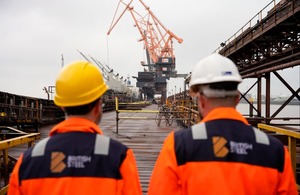Coke shipment keeps British Steel’s blast furnaces burning
The Government has confirmed the arrival of a new raw materials shipment for use in British Steel's Scunthorpe blast furnaces.

Steelmaking in Scunthorpe will continue as the Government confirmed the arrival of a new shipment of raw materials today this weekend – bolstering the UK’s national security by protecting the vital capability of domestic steel production.
A shipment of over 55,000 tonnes of blast furnace coke – more than four times the weight of the Shard – from Bluescope Steel’s plant in Australia arrived at Immingham Bulk Terminal today on the MV (merchant vessel) Navios Alegria. It will now be transferred by rail to Scunthorpe.
The coke is crucial to helping ensure both blast furnaces at British Steel can keep running for the coming months and a vital part of efforts to provide a steady pipeline of materials for continued steelmaking.
Another shipment of more than 66,000 tonnes of iron ore pellets and 27,000 tonnes of iron ore fines is due to arrive from Sweden next week, and has been paid for directly by government using existing DBT budgets – as part of this government’s commitment to backing UK industry to succeed.
In further efforts to shore up the company, British Steel has confirmed two more crucial appointments to its leadership team with a new interim Chief Operating Officer and HR Director, both of whom have more than 30 years’ experience in the steel industry.
Business Secretary Jonathan Reynolds said:
This government is on the side of British workers and British industry. The action we’ve taken to secure primary steelmaking at Scunthorpe will not only support our national security but help our steel sector supply the construction of the homes and infrastructure of the future, as part of our Plan for Change.
By securing the raw materials we need to keep Scunthorpe going for the foreseeable future we’ve helped protect thousands of crucial steel jobs. Now, British Steel workers and their families can breathe a sigh of relief and know that we are on their side.
Allan Bell, Interim CEO of British Steel said:
We’ve successfully secured the raw materials we need to keep the blast furnaces running, meaning our production of steel can continue. We would not be here today without the hard work and dedication of our specialist procurement, technical and operational teams who have worked tirelessly on short timescales to secure the required raw materials.
Over the coming months our focus will be on stabilising our operations for the long-term, cementing British Steel as one of the world’s leading manufacturers of steel.
Community Assistant General Secretary Alasdair McDiarmid said:
The imminent shipments of coke and other raw materials needed to keep the blast furnaces running over the months ahead provide much-needed assurance for our members on site in Scunthorpe. We are grateful to British Steel and the government for the decisive work they have undertaken to secure a future for the business - we have seen their commitment and dedication first-hand.
After years of neglect, we now have a UK Government which understands the vital strategic importance of steel, and is backing this up with action.
The latest delivery of vital raw materials reinforces the UK’s primary steelmaking capacity by ensuring both blast furnaces at Scunthorpe can remain operational and gives certainty to the workforce of around 3,000 employed at the steelworks.
It also comes after British Steel announced earlier this week that it has ended a consultation on staff redundancies launched in March by its owners Jingye, and confirmed it would keep both blast furnaces running, securing thousands of jobs thanks to the Government’s decisive action to step in and save the company.
Now that the necessary supplies of raw materials for the blast furnaces have been confirmed, the Government is continuing to focus on securing the long-term future of British Steel with private sector investment, working closely with a range of third parties on potential options.